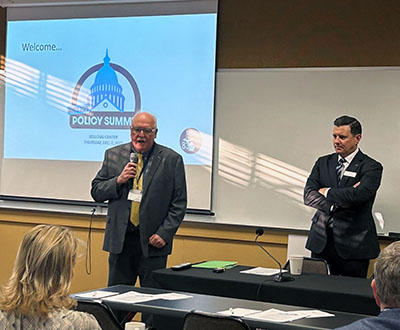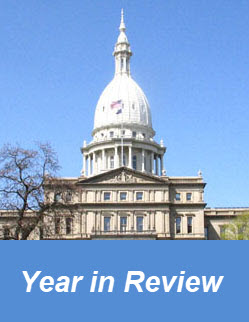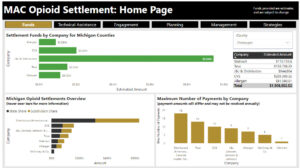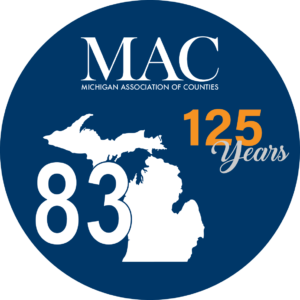Year in Review continues with focus on public safety funding, Open Meetings Act changes
 Potential new funds for public safety and long-needed repairs to the state Open Meetings Act are two of several issues discussed in Part II of Podcast 83’s “Legislative Year in Review.”
Potential new funds for public safety and long-needed repairs to the state Open Meetings Act are two of several issues discussed in Part II of Podcast 83’s “Legislative Year in Review.”
Host Stephan Currie again welcomed the MAC advocacy team of Deena Bosworth, Madeline Fata and Samantha Gibson to review key county issues in 2023 and how some of them may change in 2024, including:
Open Meetings Act: “This has been a slow process this year,” said Fata. “Over 10,000 groups adhere to OMA. … The needs are all over the place. The goal for MAC is to be able to fully participate, including voting, remotely, as long as a physical quorum is present. At least two bills introduced … that are great for smaller organizations but for county commissioners still not where we want it to be.
“We just want that ability to participate remotely as long as physical quorum is present. … We don’t have any legislation that is meeting our needs,” she added.
Public Safety Trust Fund: “(The fund) is two-bill package, modeled after our Revenue Sharing Trust Fund bills,” said Bosworth. “They carve out percentage of state sales tax and allocate to pub safety trust fund. … Part of revenue (goes) to local units of government based on their portion of violent crime throughout the state. We have worked really hard to figure out how we could get counties recognized in that legislation.
“At this point, it has passed out of house and is awaiting action in Senate,” she added.
Designated assessor: Bosworth said MAC and counties are “in a good spot” regarding legislation to have the State Tax Commission hire designated assessors, freeing local governments from a long-standing struggle to find qualified individuals. The legislation will continue its path through the process in 2024, she added.
View the full video of the episode, recorded on Dec. 4, by clicking here.
Previous episodes, including Part I of the Year in Review, can be seen at MAC’s YouTube Channel.
And you always can find details about Podcast 83 on the MAC website.
Nearly 100 county leaders participate in Policy Summit

MAC President Jim Storey welcomes the in-person and virtual audiences for the 2023 Policy Summit on Dec. 7, as Executive Director Stephan Currie looks on.
Counties have an excellent opportunity to drive policy change in Lansing in coming months, if their leaders work with MAC at every opportunity, Board President Jim Storey of Allegan County told the nearly 100 attendees of the MAC Policy Summit on Dec. 7.
Storey’s remarks opened the one-day event at the Kellogg Center, which included presentations on:
The expected effects of the recently approved juvenile justice reform package, most notably the shift to a 75 percent reimbursement rate for community-based services for counties.
The politics and implications over the upcoming debate for a statewide septic code: Presenters explained there is a consensus among stakeholders — including local health departments and septic industry experts — that reform is needed. They added, though, that the final product will not look like the legislation that was introduced in Lansing this year.
National efforts to change federal law so that counties are not left with the health bills of jail inmates who have not yet been charged with a crime. Blaire Bryant of the National Association of Counties noted that county efforts were gaining traction on Capitol Hill to reform the Medicaid Inmate Exclusion Policy.
The continuing work of a MAC-commissioned study on the services that each county provides to the local governments within its borders.
“We are thrilled by the turnout for the event — and by the extended Q&A segments in the sessions,” said Executive Director Stephan Currie. “I think the results speak to the quality of the presentations and to the eagerness of our members to stay current on policy questions so they can protect their constituents’ interests.”
Look for resources from the summit to post to MAC’s website by the middle of December.
NACo offers update on State and Local Fiscal Recovery Funds’ Obligation Interim Final Rule
 The U.S. Department of Treasury released a new interim final rule to address questions regarding the definition of “obligation” and to provide guidance and clarification for Obligation Interim Final Rule (IFR).
The U.S. Department of Treasury released a new interim final rule to address questions regarding the definition of “obligation” and to provide guidance and clarification for Obligation Interim Final Rule (IFR).
Treasury defined “obligation” as “an order placed for property and services and entering into contracts, subawards, and similar transactions that require payment.”
State and Local Fiscal Recovery Funds (SLFRF) must be obligated by Dec. 31, 2024, funds for Title I and Surface Transportation projects must be expended, by Sept. 30, 2024, and funds for most eligible uses must be expended by Dec. 31, 2026. SLFRF funds may only be used to cover costs incurred by Dec. 31, 2024. A recipient may use SLFRF funds to cover the costs of meeting the following: Reporting and compliance requirements, single audit costs, record retention and internal control requirements, property standards, environmental compliance requirements, and civil rights and nondiscrimination requirements.
Under the Obligation IFR, the definition of obligation is unchanged, but a recipient is also considered to have incurred an obligation by Dec. 31, 2024, when recipients incur costs related to the legal and administrative requirements of the SLFRF award funds. Recipient appropriation, budget, or allocation processes would not provide a standard that could be applied consistently across recipients related to the definition of obligation. Recipients can continue to charge indirect cost rates to SLFRF throughout the period of performance.
See relevant “case studies” from Treasury.
“The IFR was submitted for publication on Nov. 9, 2023, and will become effective when published. That will also begin the 30-day comment period. You may submit comments electronically through the Federal eRulemaking Portal: http://www.regulations.gov. All comments should be captioned “Coronavirus State and Local Fiscal Recovery Funds Obligation Interim Final Rule Comment.” Please also include your:
- Name
- Organization affiliation
- Address
- Email address
- Telephone number
Comments received will be posted on http://www.regulations.gov, without change, including any business or personal information provided. Comments received, including attachments and other supporting materials, will be part of the public record and subject to public disclosure. Do not enclose any information in your comment or supporting materials that you consider confidential or inappropriate for public disclosure.
 Staff picks
Staff picks
- Want to attract Gen Z workers? Up your marketing game. (RouteFifty)
- Counties brief Capitol Hill staff on housing affordability (NACo News)
- State-by-State Property Tax At-a-Glance Report (Lincoln Institute of Land Policy)
- Penguin parents sleep for just a few seconds at a time to guard newborns, study shows (Associated Press)

 Legislative successes on juvenile justice reform, property tax reimbursements and revenue sharing highlight
Legislative successes on juvenile justice reform, property tax reimbursements and revenue sharing highlight  Check out new estimates on opioid settlement payments
Check out new estimates on opioid settlement payments The Michigan State Court Administrative Office and the Michigan Department of Health and Human Services invite county officials to join an informational webinar to learn more about the recently passed Justice for Kids and Communities bill package. The bill package is the result of the work of the
The Michigan State Court Administrative Office and the Michigan Department of Health and Human Services invite county officials to join an informational webinar to learn more about the recently passed Justice for Kids and Communities bill package. The bill package is the result of the work of the 
 MAC congratulates the August 2023 NACo Leadership Academy graduates from Michigan. They join more than 10,000 graduates and current participants from across the country benefitting from the 12-week online program enabling existing and emerging county leaders to achieve their highest potential:
MAC congratulates the August 2023 NACo Leadership Academy graduates from Michigan. They join more than 10,000 graduates and current participants from across the country benefitting from the 12-week online program enabling existing and emerging county leaders to achieve their highest potential: A MAC-commissioned report on the services that counties provide to other local governments will be reviewed at the MAC Policy Summit set for Dec. 7, 2023.
A MAC-commissioned report on the services that counties provide to other local governments will be reviewed at the MAC Policy Summit set for Dec. 7, 2023. Before adjourning officially earlier this week, the Michigan Legislature pushed through a flurry of actions affecting counties in the months and years ahead, such as pre-empting local control on energy facilities and advancing much needed juvenile justice reforms.
Before adjourning officially earlier this week, the Michigan Legislature pushed through a flurry of actions affecting counties in the months and years ahead, such as pre-empting local control on energy facilities and advancing much needed juvenile justice reforms. On Thursday, December 7, The next webinar in the Opioid Settlement Technical Assistance Learning Series, “Evaluation Strategies for Projects Funded by Michigan’s Opioid Settlements,” will be held on Dec. 7 from 2 p.m. to 3 p.m.
On Thursday, December 7, The next webinar in the Opioid Settlement Technical Assistance Learning Series, “Evaluation Strategies for Projects Funded by Michigan’s Opioid Settlements,” will be held on Dec. 7 from 2 p.m. to 3 p.m. MAC’s Lansing offices will close at noon on Wednesday, Nov. 22 to observe the Thanksgiving holiday.
MAC’s Lansing offices will close at noon on Wednesday, Nov. 22 to observe the Thanksgiving holiday.


















